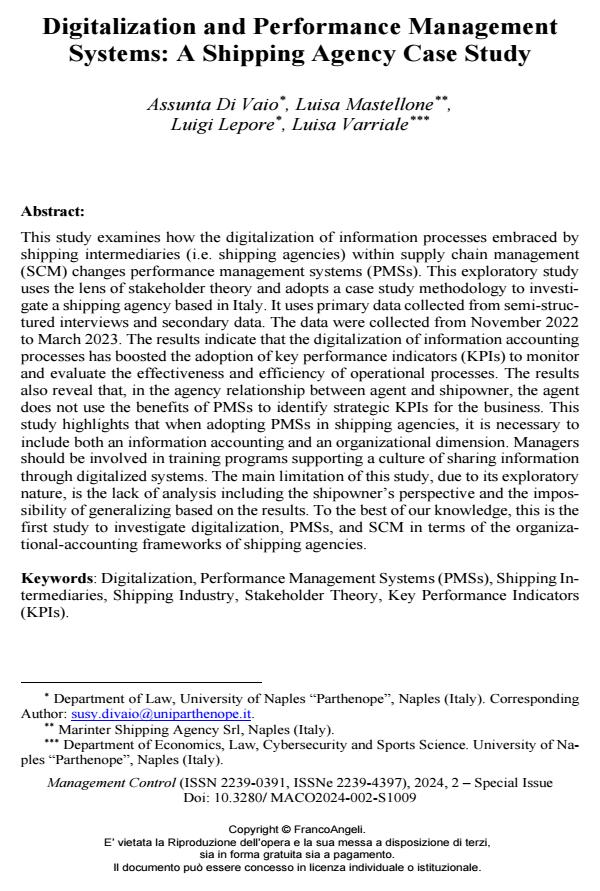Digitalization and Performance Management Systems: A Shipping Agency Case Study
Journal title MANAGEMENT CONTROL
Author/s Assunta Di Vaio, Luisa Mastellone, Luigi Lepore, Luisa Varriale
Publishing Year 2024 Issue 2024/2 Suppl.
Language English Pages 25 P. 173-197 File size 288 KB
DOI 10.3280/MACO2024-002-S1009
DOI is like a bar code for intellectual property: to have more infomation
click here

FrancoAngeli is member of Publishers International Linking Association, Inc (PILA), a not-for-profit association which run the CrossRef service enabling links to and from online scholarly content.
This study examines how the digitalization of information processes embraced by shipping intermediaries (i.e. shipping agencies) within supply chain management (SCM) changes performance management systems (PMSs). This exploratory study uses the lens of stakeholder theory and adopts a case study methodology to investigate a shipping agency based in Italy. It uses primary data collected from semi-structured interviews and secondary data. The data were collected from No-vember 2022 to March 2023. The results indicate that the digitalization of infor-mation accounting processes has boosted the adoption of key performance indi-cators (KPIs) to monitor and evaluate the effectiveness and efficiency of opera-tional processes. The results also reveal that, in the agency relationship between agent and shipowner, the agent does not use the benefits of PMSs to identify stra-tegic KPIs for the business. This study highlights that when adopting PMSs in ship-ping agencies, it is necessary to include both an information accounting and an organizational dimension. Managers should be involved in training programs sup-porting a culture of sharing information through digitalized systems. The main lim-itation of this study, due to its exploratory nature, is the lack of analysis including the shipowner’s perspective and the impossibility of generalizing based on the re-sults. To the best of our knowledge, this is the first study to investigate digitaliza-tion, PMSs, and SCM in terms of the organizational-accounting frameworks of shipping agencies.
Keywords: Digitalization, Performance Management Systems (PMSs), Shipping Intermediaries, Shipping Industry, Stakeholder Theory, Key Performance Indica-tors (KPIs).
- The dynamic response of the food import bill to global shipping costs Emiliano Magrini, El Mamoun Amrouk, Bing Qiao, in Journal of Shipping and Trade 31/2025
DOI: 10.1186/s41072-025-00218-y - An Integrated and Flexible Review Framework to Evaluate the Evolution and Barriers of Digital-Twin Technologies in Industrial and Healthcare Domains Cinzia Daraio, Simone Di Leo, Jacopo Orsini, in Global Journal of Flexible Systems Management /2025 pp.625
DOI: 10.1007/s40171-025-00447-x - Dalla misurazione dell'outcome a quella dell'impact: la Sentiment Analysis a supporto della valutazione della performance delle aziende sanitarie pubbliche Christian Di Falco, Guido Noto, Gustavo Barresi, in MANAGEMENT CONTROL 2/2025 pp.157
DOI: 10.3280/MACO2025-002008
Assunta Di Vaio, Luisa Mastellone, Luigi Lepore, Luisa Varriale, Digitalization and Performance Management Systems: A Shipping Agency Case Study in "MANAGEMENT CONTROL" 2 Suppl./2024, pp 173-197, DOI: 10.3280/MACO2024-002-S1009